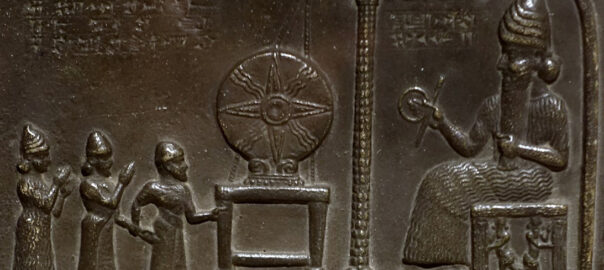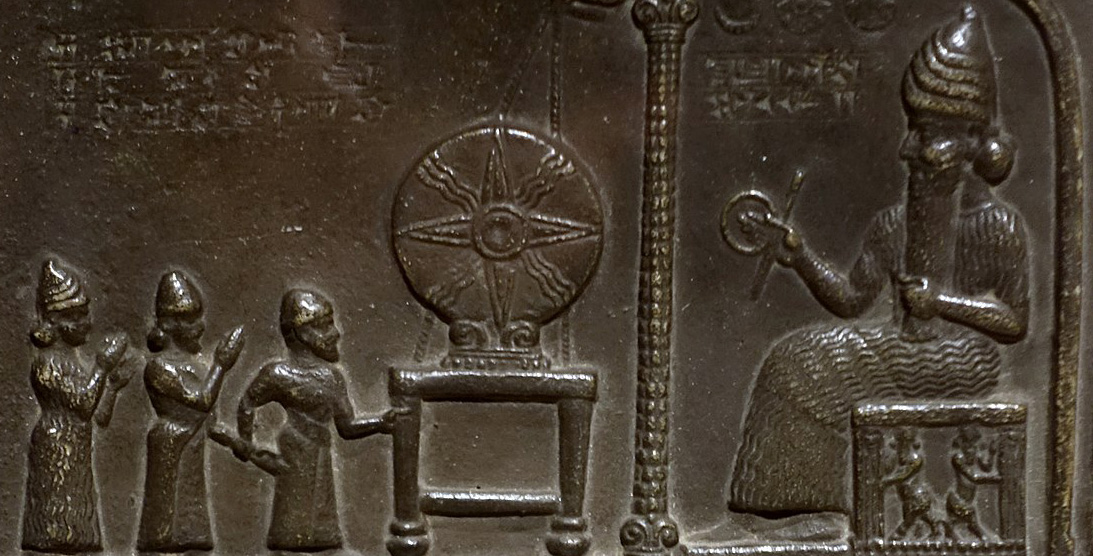
Mesopotamia:
Understanding Cuneiform Tablets and Writing
Top of tablet reporting on temple restoration, plaster cast, Middle Babylonian period, c. 885-825 BC. Harvard Semitic Museum. Wikimedia Commons.
From their cuneiform writings on clay tablets scholars know that the Mesopotamians, like the later Greeks, attempted to understand their world and the universe in any way they could.
The inscribed cuneiform tablets at Nineveh were kept on shelves in earthenware jars with identifying tags. Subjects were sometimes arranged by room: one room might be devoted to history and government, another to geography, and so on. One of the most important rooms in the palace library was devoted to myths, lists of gods, prayers, and incantations. Near the door to each room was a tablet with that room’s subject catalog. Each entry listed the title of a given work, the number of tablets in the work, the number of lines in the work, its opening words, and a location or classification symbol.
Fragments discovered at the site confirm that Assyrian scribes were tasked to copy Babylonian original tablets inscribed as early as 1,500 years before their own time.
We find antecedents of Greek philosophy in early Mesopotamian wisdom, in their forms of dialectic, dialogs, epic poetry, folklore, hymns, lyrics, prose works, and proverbs. Disputations or literary debates were a popular form of exchange. A kind of literary tournament involved two people who represented prototypes of a similar sort. By turns each presented its own qualities, advantages and credentials until one was declared the winner: it might be “Summer versus Winter,” “Bird versus Fish,” “Tree versus Reed,” “Silver versus Copper,” “Ox versus Horse,” and so on. As the Assyriologist Professor Jean Bottéro notes, “behind the mental games and the endemic passion of the ‘duel of prestige’ there lies a real analysis of the objects presented, always with the same care to dissect, to compare, to classify, to understand things.”
Mesopotamians created an “encyclopedia” compiled in the first half of the second millennium, which contained nearly ten thousand cuneiform entries that classified and organized, for example, “all the known trees and objects usually made of wood; all the reed implements; clay containers; skins and articles in leather; various metals and what is made of them; animals, both domesticated and wild; parts of the body; stones and objects in stone; plants other than trees; fish and birds; fibers, fabrics and clothes; all that can be found on the face of the earth—cities and dwelling places, mountains and waterways, in Mesopotamia itself and in the surrounding areas; and finally all things, natural and prepared, that were used as foodstuffs.” (Bottéro)
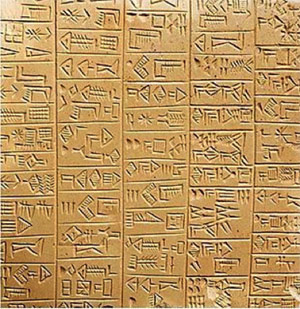
The movements of the stars and meteorites were obviously significant, affecting births both of animals and of humans, crops and health; behaviors both human and animal, accidents, and of course dreams were all portentous.
A discourse between a master and his slave, The Dialogue of Pessimism (ca 1000 BCE) is, on an obvious level, either a negative view of existence that basically states that any action is counteracted by non-action and is eventually futile, or a satire on the relationship between an indolent master and his far-wiser servant; but, as Bottéro suggests in his book Mesopotamia: Writing, Reasoning, and the Gods, it was also a vehicle through which to stimulate the mind: “a fundamental indication for us to go beyond the text itself.” When we allow that to happen, an affiliation with Socratic dialogue is evident. By simultaneously comprehending a thesis and its antithesis, individuals would be able to access an intuitive ability—a change in consciousness.
Here is a sample of the work from an edition of the text by W.G. Lambert in 1960 in his masterly work Babylonian Wisdom Literature:
VIII – Sacrifice
– Slave, listen to me!
– Here I am, master, here I am!
– Quick! Fetch me water for my hands and give it to me. I want to sacrifice to my god.
– Sacrifice, master, sacrifice! The man who sacrifices to his god is satisfied at heart. He accumulates benefit after benefit.
– O well, slave, I do not want to sacrifice to my god!
– Do not sacrifice, master, do not sacrifice! You will teach your god to run after you like a dog. Whether he asks of you “Rites” or “Do you not consult your god?” or anything else!
Philanthropy
– Slave, listen to me!
– Here I am, master, here I am!
– I want to perform a public benefit for my country!
– So do it, master, do it! The man who performs a public benefit for his country His actions are exposed to the circle of Marduk!
– O well, slave, I do not want to perform a public benefit for my country!
– Do not perform, master, do not perform! Go up the ancient tells and walk about. See the mixed skulls of plebeians and nobles. Which is the malefactor and which is the benefactor?
XI – Conclusion
– Slave, listen to me!
– Here I am, master, here I am!
– What then is good? To have my neck and yours broken, Or to be thrown into the river, is that good?
– Who is so tall as to ascend to heaven? Who is so broad as to encompass the entire world?
– O well, slave, I will kill you and send you first! –
– Yes, but my master would certainly not survive me for three days!…
External Stories and Videos
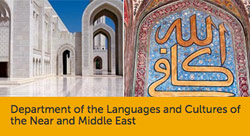
Listen: Ancient Poetry of Babylon
SOAS University of London
Hear ancient Babylonian and Assyrian poetry and literature in the original language.
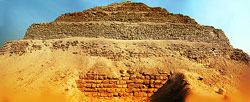
Pyramids: Stairway to the Gods
Found on at least three continents, pyramids are yet another example of how humans expressed their place in a three-tiered universe.

